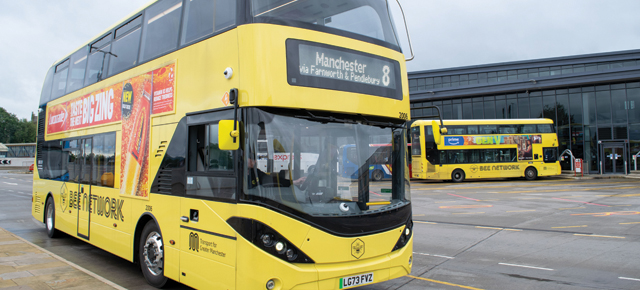Vernon Everitt asks passengers to ‘bear with us’ ahead of launch

Greater Manchester transport commissioner Vernon Everitt has urged bus users to remain patient as the second phase of the franchised Bee Network is set to launch on March 24.
This phase will cover Oldham, Rochdale, and parts of Bury, Salford, and north Manchester and affects a total of 136 local bus routes. The majority of these routes will be operated by Stagecoach Manchester, while First Bus and Rotala’s Diamond Bus operation will handle a smaller number of contracts.
With the addition of these routes to the existing 188 from phase one, Transport for Greater Manchester (TfGM) estimates that 50% of the region’s buses will be franchised and managed as part of the Bee Network.
Phase two of the Bee Network brings key improvements, including integrated ticketing, expanded early and late services, and enhanced connections to first and last trams. TfGM has committed to reversing frequency reductions introduced by commercial operators over the past year. Additionally, plans are underway to enhance routes with performance issues through measures such as extra buses on standby, timetable adjustments, and reviews of road junctions and traffic light phasing to optimise bus flow at key junctions. A total of 50 new zero-emission buses and 84 new Euro 6 buses will be introduced in phase two areas in the coming months.
Everitt, mindful of the disruption encountered during the first phase rollout, has asked passengers to be patient.
Overnight changes of this magnitude involving the handover of numerous routes, vehicles and depots between operators is a complex process
“Overnight changes of this magnitude involving the handover of numerous routes, vehicles and depots between operators is a complex process, so we also ask passengers to bear with us in the early days while the new arrangements bed down,” he said.
Everitt added TfGM is considering the introduction of night bus services on a pilot basis. These services aim to support individuals working in the night-time economy or those with shifts starting or ending in the early hours of the morning.
“It’s important people have a safe and cost-effective way of getting to and from work when they need it. Greater Manchester is a 24-hour city and should have a public transport system to match that,” he added.
Everitt acknowledged that there is still work to be done to enhance the performance of phase two services. “Next month marks the beginning of a journey of continuous improvement, which will be the primary focus for Transport for Greater Manchester and our new bus operators in the months ahead,” he added.
This article appears in the latest issue of Passenger Transport.
DON’T MISS OUT – GET YOUR COPY! – click here to subscribe!









